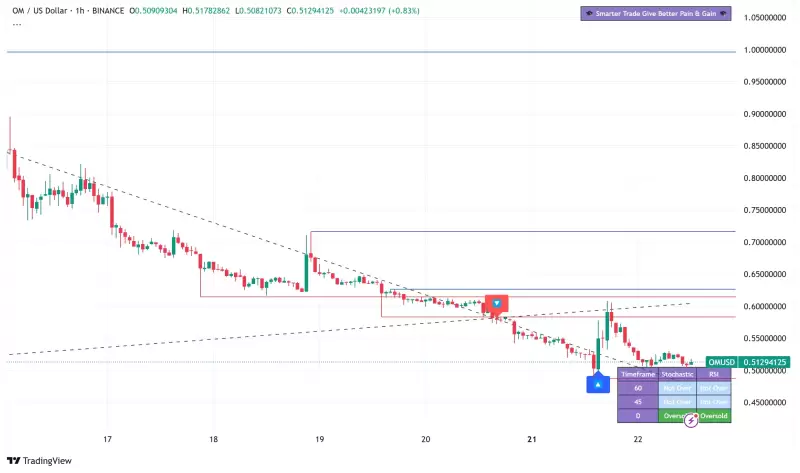 |
|
 |
|
 |
|
 |
|
 |
|
 |
|
 |
|
 |
|
 |
|
 |
|
 |
|
 |
|
 |
|
 |
|
 |
|
米国司法省は、「デジタル資産に対する規制枠組みを重ね合わせる効果を持つ訴訟または執行措置を追求しなくなります」

Earlier this month, the Department of Justice disbanded its National Cryptocurrency Enforcement Team and said it would no longer pursue what Deputy Attorney General Todd Blanche described as “regulation by prosecution.”
今月初め、司法省は国家暗号通貨執行チームを解散させ、トッド・ブランシュ副司法長官が「検察による規制」と説明したことをもはや追求しないと述べた。
You’re reading State of Crypto, a CoinDesk newsletter looking at the intersection of cryptocurrency and government. Click here to sign up for future editions.
あなたは、暗号通貨と政府の交差点を見るコインドスクのニュースレターであるCryptoの状態を読んでいます。将来のエディションにサインアップするには、ここをクリックしてください。
The U.S. Department of Justice “will no longer pursue litigation or enforcement actions that have the effect of superimposing regulatory frameworks on digital assets” in lieu of regulatory agencies putting together their own frameworks for overseeing the sector, a 4-page memo signed by Deputy Attorney General Todd Blanche on April 7 said. In other words, the DOJ will no longer pursue “regulation by prosecution,” the memo said.
米国司法省は、規制当局がセクターを監督するための独自の枠組みをまとめるための独自の枠組みをまとめるために、デジタル資産に規制枠組みを重ね合わせる効果を持つ訴訟または執行措置を追求することはもうありません」と、4月7日に副検事総長が署名した4ページのメモが述べました。言い換えれば、DOJはもはや「起訴による規制」を追求することはなくなるとメモは述べた。
The DOJ's memo raised concerns that it may mean criminal activities in the crypto sector would not be prosecuted, or at least prosecuted as heavily as it was under the past several years — both by disbanding the National Cryptocurrency Enforcement Team (NCET) and by shifting the entity's priorities.
DOJのメモは、暗号部門での犯罪行為が起訴されないことを意味する可能性があるという懸念を提起しました。これは、過去数年未満のように少なくとも重く訴追されます。
At a practical level, the memo itself is internal guidance but may not be a binding document. Multiple attorneys told CoinDesk they interpreted the guidance to indicate that the DOJ would still bring fraud or other criminal cases involving crypto, but would try to avoid any cases where the DOJ itself had to determine if a digital asset was a security or a commodity.
実用的なレベルでは、メモ自体は内部ガイダンスですが、拘束力のあるドキュメントではない場合があります。複数の弁護士は、Coindeskに、DOJが詐欺または暗号を含む他の刑事事件を提起することを示すためにガイダンスを解釈したが、DOJ自体がデジタル資産がセキュリティであるか商品であるかを判断しなければならないケースを避けようとすると語った。
“Fraud is still fraud,” said Josh Naftalis, a partner at Pallas Partners LLP and a former prosecutor with the U.S. Attorney's office for the Southern District of New York. “This memo does not seem to say the DOJ is not going to prosecute fraud in the crypto space.”
「詐欺はまだ詐欺です」と、パラスパートナーズLLPのパートナーであり、ニューヨーク南部地区の米国検事局の元検察官であるジョシュ・ナフタリスは言いました。 「このメモは、DOJが暗号化スペースで詐欺を起訴するつもりはないと言っているようには見えません。」
Still, the memo raised alarms for prominent Democrats who questioned whether the DOJ was suggesting it would let criminal conduct occur. Senators Elizabeth Warren, Mazie Hirono, Richard Durbin, Sheldon Whitehouse, Christopher Coons and Richard Blumenthal wrote a letter to Blanche, saying his “decision to give a free pass to cryptocurrency money launderers” and shut down the NCET were “grave mistakes that will support sanctions evasion, drug trafficking, scams and child sexual exploitation.”
それでも、このメモは、DOJがそれが犯罪行為を起こさせることを示唆しているかどうかを疑問視した著名な民主党員のアラームを提起しました。エリザベス・ウォーレン上院議員、マジー・ヒロノ、リチャード・ダービン、シェルドン・ホワイトハウス、クリストファー・クーンズ、リチャード・ブルーメンタルはブランシュに手紙を書いた。
“Specifically, the Department will no longer target virtual currency exchanges, mixing and tumbling services and offline wallets for the acts of their end users or unwitting violations of regulations — except to the extent the investigation is consistent with the priorities articulated in the following paragraphs,” the DOJ memo said, a passage the Senators' letter referenced.
「具体的には、部門は、調査が次の段落で明確にされた優先順位と一致する範囲を除いて、エンドユーザーの行為または無意識の違反のために、仮想通貨交換、混合およびタンブリングサービス、およびオフラインウォレットをターゲットにしなくなります」
New York Attorney General Letitia James wrote an open letter to Senate leaders in the same week asking them to advance legislation to address cryptocurrency risks. She did not specifically reference Blanche's memo but detailed possible ways to better police the sector through legislation.
ニューヨーク州司法長官のレティティア・ジェームズは、同じ週に上院の指導者に公開書簡を書いた。彼女はブランシュのメモを具体的に参照していませんでしたが、法律を通じてセクターをよりよく警察するための可能な方法を詳細に参照しました。
Katherine Reilly, a partner at Pryor Cashman and a former prosecutor with the U.S. Attorney's Office for the Southern District of New York, told CoinDesk that most of the major crypto cases brought by the DOJ in recent years would not have been affected had this guidance been in effect.
プライアー・キャッシュマンのパートナーであり、ニューヨーク南部地区の米国弁護士事務所の元検察官であるキャサリン・ライリーは、このガイダンスが有効であった場合、近年DOJが提起した主要な暗号事件のほとんどが影響を受けなかっただろうとコインデスクに語った。
The BitMEX case in 2020, when the DOJ and Commodity Futures Trading Commission brought unregistered trading and other charges against the platform, is "probably closest to the line" of being a case that may not have been brought under this guidance, she said.
2020年のBitmex事件は、DOJおよびCommodity先物取引委員会が未登録の取引やその他のプラットフォームに対するその他の請求をもたらしたとき、このガイダンスの下でもたらされていない可能性のあるケースであるという「おそらく最も近い」と彼女は言った。
Trump pardoned BitMEX, its founders and a senior employee in late March, barely two weeks before the DOJ memo was shared.
トランプは、DOJメモが共有されるわずか2週間前に、3月下旬にその創設者であり上級従業員であるBitmexを許しました。
"I think that it's clear that the Justice Department wants to limit the DOJ's role in regulating the crypto industry … looking beyond its role in other crimes, fraud, laundering proceeds from narcotics trafficking, things like that, and sort of take a step back from the role of trying to bring order and fairness to the crypto industry as a whole," Reilly said.
「司法省が暗号産業の規制におけるDOJの役割を制限したいと考えていることは明らかだと思います。他の犯罪、詐欺、麻薬の人身売買からの洗濯手段、そのようなこと、そして暗号業界全体に秩序と公平性をもたらす役割から一歩後退することは明らかです」とReillyは言いました。
That's "probably the intent behind the BitMEX pardons too," she said.
それは「おそらくビットメックスの恩赦の背後にある意図だ」と彼女は言った。
Naftalis said the DOJ will continue to pursue drug, terrorism or other illicit financing charges even under the memo.
ナフタリスは、DOJがメモの下でさえも薬物、テロリズム、またはその他の違法な資金調達罪を追求し続けると述べた。
"I think that the headline for the industry is to the extent that there are legal uses of crypto, they're not going to set the guard rail by criminal enforcement," he said. "That's for Congress."
「業界の見出しは、暗号の法的使用がある限り、彼らは刑事執行によってガードレールを設定するつもりはないと思う」と彼は言った。 「それは議会のためです。」
One section of the memo tells prosecutors not to charge Bank Secrecy Act violations, unregistered securities offering violations, unregistered broker-dealer violations or other Commodity Exchange Act registration violations "unless there is evidence that the defendant knew of the licensing or registration requirement at issue and violated such a requirement willfully."
メモのあるセクションは、検察官に、銀行の秘密法違反、違反を提供する未登録の証券、未登録のブローカーディーラー違反、またはその他の商品交換法登録違反を請求しないように指示します。
Carla Reyes, an Associate Professor of Law at SMU Dedman School of Law, told CoinDesk that this may be referencing recent cases where developers build tools under the impression that they were not committing unlicensed money transmitting activities under existing guidance but may get charged anyway.
SMU Dedman School of Lawの法律准教授であるCarla Reyesは、Coindeskに、開発者が既存のガイダンスの下で無許可の送金活動をコミットしていないが、とにかく請求される可能性があるという印象の下でツールを構築する最近のケースを参照している可能性があると語った。
"Most criminal statutes require some level of knowledge to define your intention, and knowledge that you're committing a crime when you do it," she said. "The further away you get from that, the lesser the charge, but the more willful [and] intentional it
「ほとんどの刑事法は、あなたの意図を定義するためにある程度の知識と、あなたがそれをするときに犯罪を犯しているという知識を必要とします」と彼女は言いました。 「そこから遠く離れているほど、料金は少なくなりますが、意図的な意図的です
免責事項:info@kdj.com
提供される情報は取引に関するアドバイスではありません。 kdj.com は、この記事で提供される情報に基づいて行われた投資に対して一切の責任を負いません。暗号通貨は変動性が高いため、十分な調査を行った上で慎重に投資することを強くお勧めします。
このウェブサイトで使用されているコンテンツが著作権を侵害していると思われる場合は、直ちに当社 (info@kdj.com) までご連絡ください。速やかに削除させていただきます。




























































